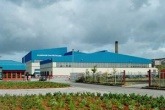Novelis achieves 90 per cent emissions reduction using hydrogen in aluminium recycling
Major advancement in sustainable aluminium production as Novelis demonstrates viable hydrogen-powered recycling process, marking significant progress toward industry decarbonisation goals
 Novelis has successfully tested hydrogen fuel to power an aluminium recycling furnace at its Latchford plant in Warrington, achieving up to 90 per cent reduction in CO2 emissions compared to natural gas. The trial (announced in 2023), conducted as part of the UK government's Industrial Fuel Switching Competition programme, required installation of new burners, regenerators, and furnace lining material.
Novelis has successfully tested hydrogen fuel to power an aluminium recycling furnace at its Latchford plant in Warrington, achieving up to 90 per cent reduction in CO2 emissions compared to natural gas. The trial (announced in 2023), conducted as part of the UK government's Industrial Fuel Switching Competition programme, required installation of new burners, regenerators, and furnace lining material.
"Exploring renewable energy sources, such as hydrogen, making first mover investments, and reducing energy intensity are part of our 3x30 vision to advance aluminium as the material of choice with circular solutions," said Emilio Braghi, Executive Vice President, Novelis Inc, and President, Novelis Europe.
Industrial-scale testing validates hydrogen potential
The trials involved blending varying percentages of hydrogen with natural gas (30 per cent-100 per cent) to evaluate infrastructure impact and equipment compatibility. Several hundred tonnes of 3000 series scrap aluminium alloy were remelted and cast into sheet ingots during the testing phase.
The successful trial positions Novelis among the pioneers in industrial-scale hydrogen use for aluminium recycling. This development is particularly significant as the aluminium industry seeks ways to decarbonise its energy-intensive processes.
Further downstream processing, including rolling and finishing, will be completed at other Novelis plants in Europe to establish end-to-end parameters for hydrogen-based recycled alloy production. A comprehensive report will be released as part of the UK government's Industrial Fuel Switching programme later this year.
Regional hydrogen infrastructure development
The demonstration project is supported by a £4.6 million grant from the UK government's £1 billion Net Zero Innovation Portfolio and forms part of the wider HyNet project. HyNet is establishing the UK's first low carbon industrial cluster across the North West and North Wales, focusing on hydrogen production, transportation, and storage, alongside carbon capture solutions.
Allan Sweeney, Plant Manager at Novelis Latchford, commented: "The use of hydrogen is not common in the aluminium industry today and we are very proud to be one of the pioneers to have tested this new fuel at an industrial scale and in a real-world environment. The results from Latchford will drive further research into the potential deployment of hydrogen in our recycling operations worldwide."
Expansion of recycling capacity
The hydrogen trials align with Novelis's broader sustainability initiatives at the Latchford site. The company is investing approximately £70 million to double its used beverage can (UBC) recycling capacity at the plant, adding 85 kilotonnes per year and reducing Novelis Europe's CO2 emissions by more than 350,000 tonnes annually. The expansion is scheduled for commissioning in December 2026.
The Latchford facility is one of Europe's largest aluminium beverage can recycling plants, with an annual recycling capacity of up to 195,000 tonnes. The plant has sufficient capacity to recycle every aluminium beverage can sold in the UK and operates Europe's largest closed-loop recycling system for automotive aluminium rolled products.
The successful trial demonstrates the viability of hydrogen as a decarbonisation solution for energy-intensive industrial processes. This advancement is particularly relevant as the aluminium industry faces increasing pressure to reduce its environmental impact while meeting growing demand for recycled materials.
As part of its new Novelis 3x30 vision, the company aims to increase recycled content to 75 per cent from today's 63 per cent and reduce carbon emissions to less than 3 tonnes CO2e per tonne of aluminium shipped by 2030.






